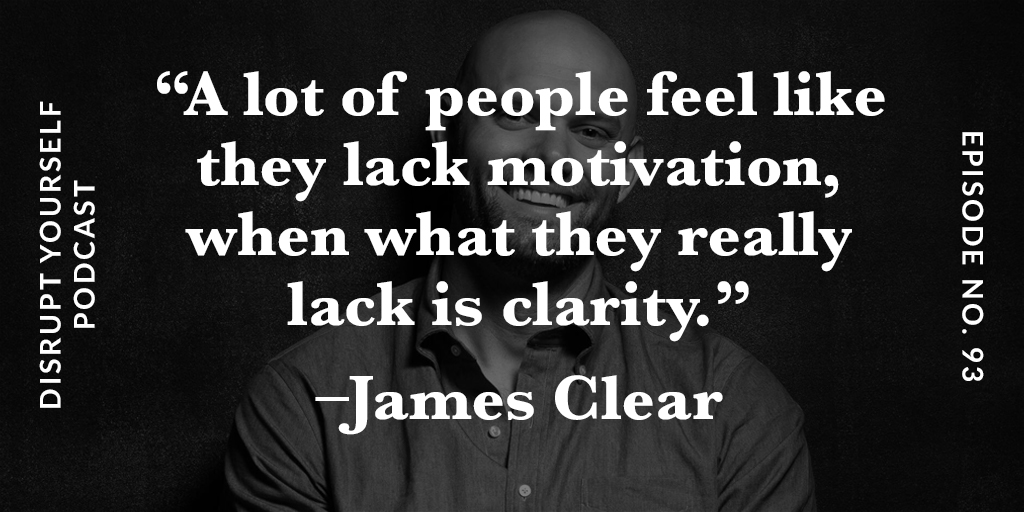“Disruption,” as a word, has always had an explosive sound to me. Disruption causes your world to shift and change—an earthquake in the making. However, every once in a while, I’m reminded that disruption does not have to be earth-shattering. Sometimes the smallest changes can have a long-lasting impact on your life, especially when those changes become habits.
My guest today is James Clear, and he’s the go-to expert for those small changes, or Atomic Habits (as his New York Times best-selling book refers to them). James advocates that the way to build habits is to try and get just one percent better each day—something that sounds almost too easy to do, and yet builds a firm foundation for continual improvement.
“I like to refer to habits as the compound interest of self-improvement, and the reason why I like that phrase is that, the same way that money multiplies through compound interest, the effects of your habits multiply as you repeat them over time…[I]f you can get just one percent better each day, so .01365, you end up 37 times better by the time you get to the end of the year.”
Getting one percent better can be as simple as reading one page of a book per day, or driving all the way to the gym and exercising for only five minutes. James refers to this as “the art of showing up.” By practicing the basic decision to “show up” for these activities you can train yourself to overcome your objections and actually start. You’re less likely to quit on yourself when the decision to change is small and simple. James recommends a “two-minute” rule for habits: whatever habit you’re trying to build, scale it down to just two minutes or less. Once you’ve mastered it you can optimize and improve as needed.

But even before you get to that stage, ask yourself what kind of person you want to be. If you want to get healthy, ask yourself each morning, “What would a healthy person do?” If you want to be a writer, ask yourself, “What would a writer do?”
“Every action you take is like a vote for the type of person that you want to become or the type of person that you believe that you are, and so the more that you perform these little habits, whether it’s reading one page, or writing one sentence, or…meditating for 60 seconds, the more you reinforce, you provide evidence, you cast a vote for that identity of being a reader, or being a writer, or being a meditator.”
James is great at giving practical tips for improvement, and I hope you enjoy our discussion as much as I did! Thank you to James for being a great guest. I am especially grateful today for Ralph Campbell, a Disrupt Yourself podcast listener who introduced me to the work of James, leading to this interview today. I really value the feedback of my listeners, and suggestions for future guests are appreciated!
Download today’s episode on iTunes or listen using the player above. If you like what you hear please leave a review!
Takeaways from this episode:
- Habits are the “compound interest of self-improvement.” If you can get just one percent better at something each day, by the end of a year (365 days) you will be 37 times better. Conversely, if you get 1% worse each day, the skill will have diminished to almost nothing at the end of a year.
- Keep habits to the “two-minute rule.” It can be tempting to go big on your goals, but this also makes them harder to maintain. If your desire is to read 50 books in a year, dial it back to a goal of reading one page per day. You have the flexibility to read and do more, but you can do something simple and feel success rather than failure while learning to “show up” for your goal.
- Point and call—when it comes to changing our habits, the first thing we need to do is to be aware of what our habits currently are. Calling out loud what we are about to do (“I’m about to watch YouTube,” or “I’m writing a blog post”) makes us conscious of the actions we are taking and then allows us to make a conscious decision to continue that action. It may feel silly, but it works!
- Implementation Intentions—Be specific about the behavior you want, the time you will do it, and location. When we plan for an action to occur it is more likely to happen. Example: “After I eat a lunch of bacon, and eggs, and cheese, at noon today, I will sit down and practice the piano for 10 minutes.”
- Track your habits. Give yourself a visual way of seeing your progress so that when you are tempted to deviate from your goal you can see how far you’ve come, and motivate yourself to continue your streak.
- Repetition is a form of change. Sometimes it is better to do a habit more often than to increase the intensity of the habit (for example, instead of jumping to run 20 miles a day you can run 2 miles per day 5 days a week instead of 2 days a week).
- Never miss a habit twice—it’s ok to have an off day, but don’t let the slide continue. Every action is a vote for the type of person we want to be.
Links Mentioned in this Episode:
- James Clear – Website | Twitter | Instagram | Facebook
- Build an A-Team: Play to Their Strengths and Lead Them Up the Learning Curve by Whitney Johnson
- Download a free chapter from Build an A-Team

